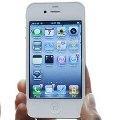New iPhone Well Received Around World
In the United States, Britain and Japan, Apple's iPhone has reached celerity status. Customers lined up for hours for Apple's newest phone, the iPhone 4. Alex Lee lives in Dubai, but traveled to London for his phone. "The reason why we want to come to this one is because we really want this phone," he said. The iPhone 4 is faster, thinner, has a longer battery life, and it features video calling. Apple is not the only company that makes so-called smartphones that allow users to access the Internet. But loyal customers say its simplicity makes the iPhone stand out.
"The user friendliness on the IPhone is unbelievable. It's like even a layman can use it," said one man. By the end of July, Apple says the iPhone 4 will be available in 18 additional countries. By the end of September, in 88 countries worldwide.
But technology expert Rob Atkinson says smartphones will most likely not be widely used in many developing nations because of their cost, and the cost of connected on-line data plans. "So I don't think we're going to see a lot of deployment in a region or continent like Africa. You might see some among the smaller groups of higher income users there but what I do think you will see is growth in countries in places like Latin America," he said. Atkinson says countries with a growing middle class will embrace smartphones much faster. "In developing countries, that's going to be a longer process where you'll have perhaps business people, farmers, small business people, professionals who will be the first adopters - the doctors, government officials - and then it will slowly as you get more apps (applications) slowly permeate out probably," he said. Atkinson says Apple's iPhone faces growing competition from other companies, such as Google, that make their own smartphones. With competition, experts expect prices to drop, making smartphones much more accessible to consumers around the world.

